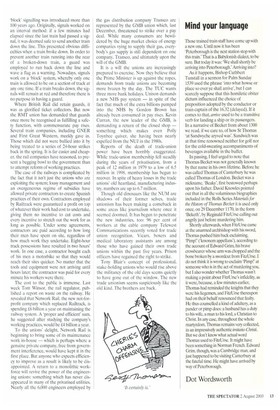Mind your language
Those trained train staff have come up with a new one. Until now it has been 'Peterborough is the next station stop with this train.' That is a Babylonish dialect, to be sure. But today it was: 'We shall shortly be arriving into Peterborough.' Arriving into?
As it happens, Bishop Cuthbert Tunstall in a sermon for Palm Sunday 1539 used the phrase 'into what howse or place so ever ye shall arrive', but I can scarcely suppose that this homiletic °biter dictum influenced the choice of preposition adopted by the conductor or train captain of the 16.32 (delayed). If it comes to that, arrive used to be a transitive verb for landing a ship or its passengers. In a narrative of Becket from about 1300 we read, if we care to, of how St Thomas 'at Sandwyche aryved was'. Sandwich was at that time renowned neither for golf nor for the cold-sweating accompaniments of beverages available in the buffet.
In passing, I feel urged to note that Thomas Becket was not generally known by that name in his own lifetime. Before he was called Thomas of Canterbury he was called Thomas of London. Becket was a nickname, 'Beaky', first bestowed perhaps upon his father. David Knowles pointed out that in all the voluminous biographies included in the Rolls Series Materials for the History of Thomas Becket it is used only once, on 29 December 1170, in the form `Beketh', by Reginald FitzUrse calling out angrily just before murdering him.
Shortly afterwards, when FitzUrse came at the unarmed archbishop with his sword, Thomas pushed him back exclaiming, 'Pimp!' ('lenonern appellans), according to the account of Edward Grim, his brave crosthearer whose arm was chopped and the bone broken by a swordcut from FitzUrse. I do not think it is wrong to exclaim 'Pimp!' at someone who is in the act of murdering you, but I also wonder whether Thomas wasn't making a point about FitzUrse's infidelity, as it were, because, a few minutes earlier, Thomas had reminded the knights that they were his liegemen, and FitzUrse thereupon had on their behalf renounced that fealty. He thus counselled a kind of adultery, as a pander or pimp does: a husband has a duty to his wife, a man to his lord, a Christian to Christ. In any case, throughout the whole martyrdom, Thomas remains very collected, in an impressively authentic imitatio Christi. But we don't know what actual word Thomas used to FitzUrse. It might have been something in Norman French. Edward Grim, though, was a Cambridge man, and just happened to be visiting Canterbury at the fateful time. He might have arrived by way of Peterborough.
Dot Wordsworth


























































 Previous page
Previous page